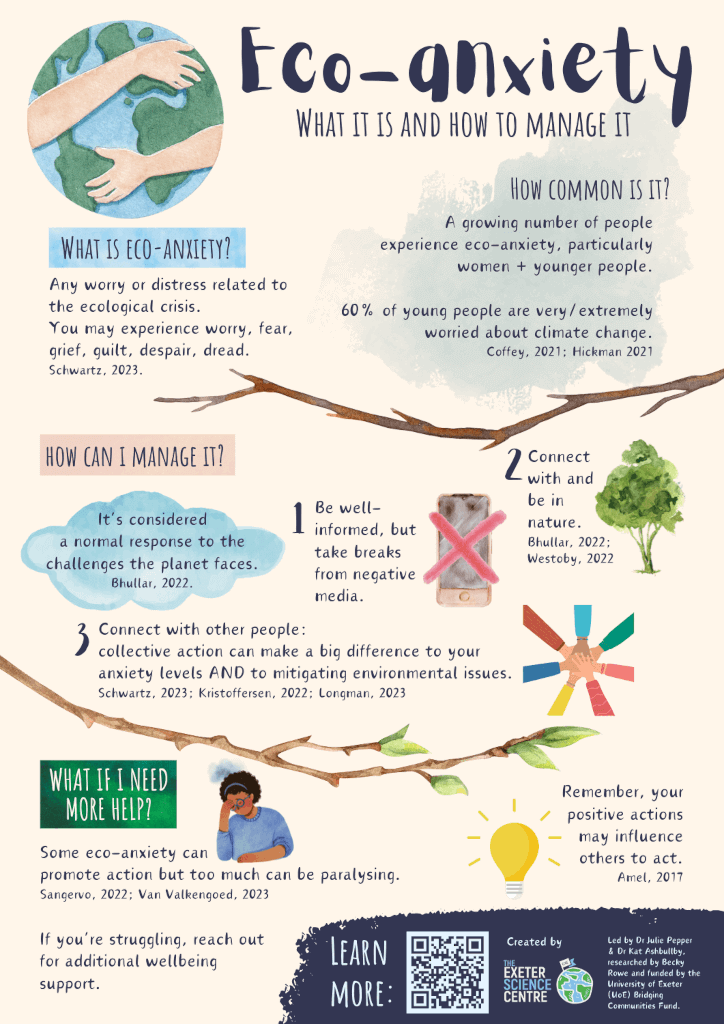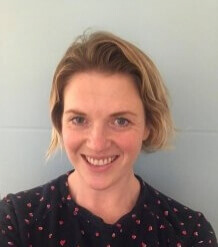
What is Eco-Anxiety?
Many experts see eco anxiety as a completely rational response to the issues our planet faces. Although it can affect people differently, there are ways to tackle it. Collective action, in particular, can be a powerful solution in both addressing your feelings and working on environmental issues themselves. Find out more in our infographic:

Download a high-resolution copy of this infographic in png and pdf.
Shorts video series
In this series of Shorts videos, we summarise what eco-anxiety is, and some of the ways that research suggests we can tackle it, with some local examples.
Huge thanks to everyone who took part in this video series, including staff and students from the University of Exeter.
In the second video, we featured James Hoggett from Natural England – follow the link to find out about their work and career opportunities.
In video 3, we feature Be The Change Society – a student society at the University of Exeter focused on sustainability and student empowerment to make a difference. Find out more about them on the Exeter Students’ Guild page, and stay updated on the Be The Change Instagram page.
We also appeared in video 3! Find out more about volunteer opportunities with us.
There are more resources and references in the section below, to both get support and get involved!
More resources
There’s lots of research on eco-anxiety – here, we pick out some useful resources to help you understand more about it, and list out the papers referenced in the infographics above. Huge thanks to Becky Rowe, Be The Change Society President, for compiling this list!
Further Reading
Advice:
Friends of the Earth – Resilience and eco anxiety
Young Minds – How to cope with climate anxiety
Community support + action
Check out our ‘Make an Impact‘ page for lots of ideas for local action.
There is a global network of Climate Cafés, set up to enable people to get together, chat and take action on climate change. The Exeter Climate Café meets weekly, with additional events across the city – get updates via their Facebook page.
There are other groups which are taking positive action in different ways in Exeter, including Extinction Rebellion, Exeter Community Garden and Exeter Community Alliance.
Community Action Groups (CAG) Devon is a growing network of climate action groups in the region – get involved, or get inspiration from existing projects for your community!
Professional support:
If you’re struggling with eco-anxiety, there’s always help available:
Samaritans – free 24/7 helpline to talk about anything that is bothering you
Mind – specialist mental health charity
Rethink – Mental Illness advice and support
Infographic references
- Swartz, S. E. O., Benoit, L., Clayton, S., Parnes, M. F., Swenson, L., & Lowe, S. R. (2023). Climate change anxiety and mental health: Environmental activism as buffer. Current Psychology, 42, 16708-16721. https://doi.org/10.1007/s12144-022-02735-6
- Coffey, Y., Bhullar, n., Durkin, J., Islam, M, S., & Usher, K. (2021). Understanding eco-anxiety: a systematic scoping review of current literature and identified knowledge gaps. Journal of Climate Change and Health, 3. https://doi.org/10.1016/j.joclim.2021.100047
- Hickman, C., Marks, E., Pihkala, P., Clayton, S., Lewandowski, R. E., … & Mayall, E. E. (2021). Climate anxiety in children and young people and their beliefs about government responses to climate change: a global survey. The Lancet Planetary Health, 5(12), 863-873. https://doi.org/10.1016/S2542-5196(21)00278-3
- Bhullar, N., Davis, M., Kumar, R., Nunn, P., & Rickwood, D. (2022). Climate anxiety does not need a diagnosis of a mental health disorder. The Lancet Planetary Health, 6(5). https://doi.org/10.1016/S2542-5196(22)00072-9
- Westoby, R., Clissold, R., & McNamara, K. E. (2022). Turning to Nature to Process the Emotional Toll of Nature’s Destruction. Sustainability, 14(13). https://doi.org/10.3390/su1413794
- Kristoffersen, M. (2022). Collective action helps young adults deal with climate change anxiety. Yale School on Public Health. https://ysph.yale.edu/news-article/collective-action-helps-young-adults-deal-with-climate-change-anxiety
- Longman, J., Braddon, M., Verlie, B., Schlosberg, D., Hampshire, L., Hawke, C., Noonan, A., & Saurman, E. (2023). Building resilience to the mental health impacts of climate change in rural Australia. The Journal of Climate Change and Health, 12. https://doi.org/10.1016/j.joclim.2023.100240
- Sangervo, J., Jylha, K & Pihkala, P. (2022). Climate anxiety: Conceptual considerations, and connections with climate hope and action. Global Environmental Change, 76. https://doi.org/10.1016/j.gloenvcha.2022.102569
- Van Valkengoed, A. M., Steg, L., & de Jonge, P. (2023). Climate Anxiety: A Research Agenda Inspired by Emotion Research. Emotion Review, 0(0). https://doi.org/10.1177/17540739231193752
- Amel, E., Manning, C., Scott, B., & Koger, S. (2017). Beyond the roots of human inaction: Fostering collective effort toward ecosystem conservation. Science, 356(356), 275-279. https://doi.org/10.1126/science.aal1931
Meet the academics
We’re so grateful to project leads Dr Kat Ashbullby and Dr Julie Pepper, and researcher Becky Rowe (MSc Psychology student and President of Be The Change Society) for providing the academic content and guidance, and the University of Exeter (UoE) Bridging Communities Fund for funding this project.

Dr Katherine Ashbullby
University of Exeter
Katherine’s research has spanned across different areas of psychology, including economic, organisational, health and environmental psychology. She is also passionate about student health and wellbeing. Find out more about Katherine here.

Dr Julie Pepper
University of Exeter
Julie’s background is in mathematics and psychology, and she has a keen interest in maths anxiety and education, as well as workplace psychology and health & wellbeing. Find out more about Julie here.